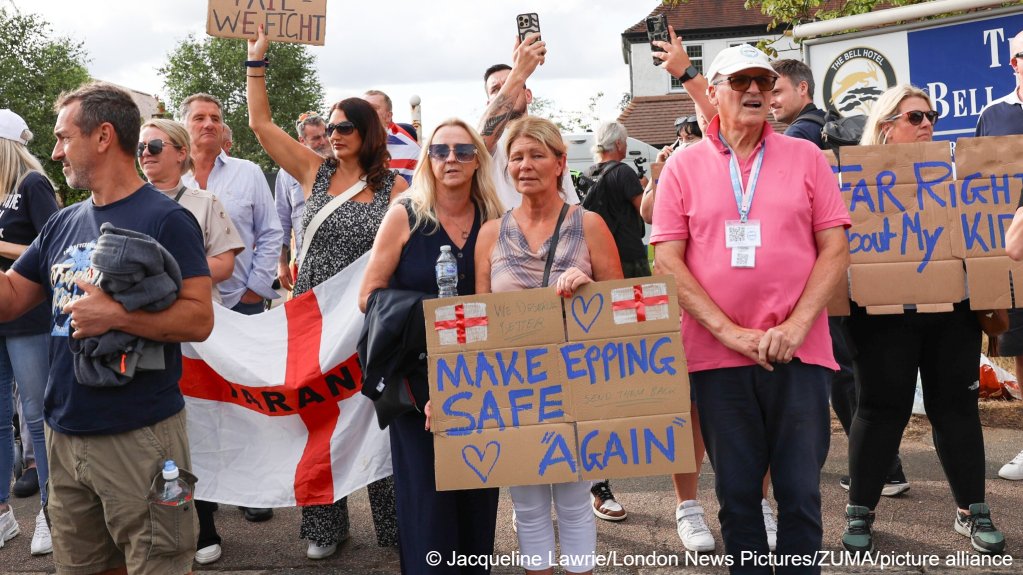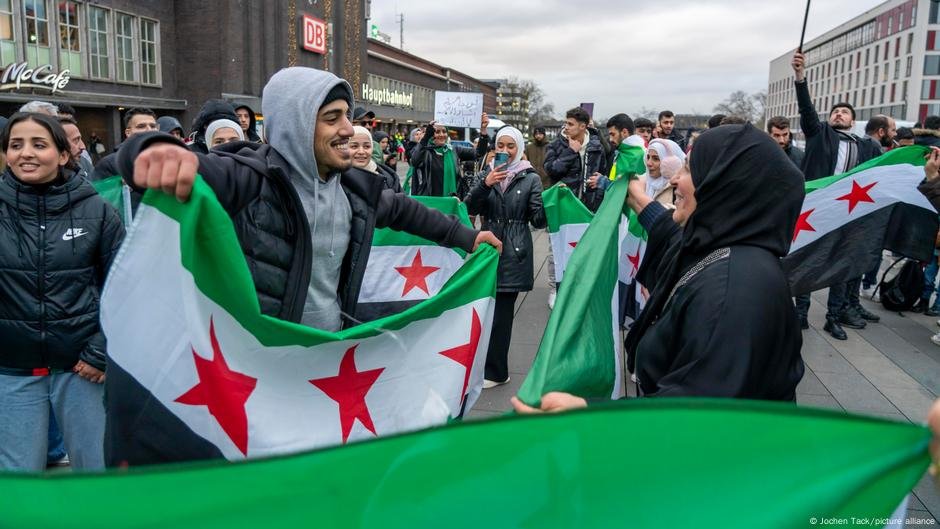Across Europe, self-styled protective forces comprised of loosely organized groups that call themselves 'citizen patrols' or 'migrant hunters' are patrolling borders, tracking down asylum seekers, and harassing humanitarian workers. Research suggests a complex mix of social, strategic, and personal factors is driving the rise of these groups.
As the employee drove up to RAF Wethersfield, a former military base in Essex, northeast of London, a group surrounded his car.
With mobile phones recording, the group reportedly yelled, "Traitor", threatening to expose the employee’s license plate. The encounter was live-streamed to the group’s thousands of viewers.
The British newspaper The Independent, which documented the incident last month, reported that the group of self-styled "migrant hunters" was angry over the military base being used as accommodations for asylum seekers.
These self-styled vigilantes reportedly pose as journalists, showing up at accommodation centers and hotels to harass employees as well as asylum seekers. Then they post the footage online, sharing the locations of hotels that shelter asylum seekers and call on their followers to support anti-migrant protests.

The incident at the former military base was in relation to ongoing anti-migrant protests that started in July and have spread across the country.
However, across Europe, numerous media reports show that loosely organized groups that call themselves "citizen patrols", "migrant hunters," or self-styled protective forces are patrolling borders, tracking down asylum seekers, or harassing humanitarian workers.
'Defenders' of the community
Across Europe, vigilante groups position themselves as 'defenders' of the community, intervening where they claim police and state authorities have failed.
Their outward goal is to protect citizens from what they perceive as criminal or threatening. Their justifications often tap into broader social fears and mirror topics already dominating headlines, giving the groups an air of legitimacy.
Research by the Radicalisation Awareness Network (RAN) -- an EU-funded network bringing together practitioners such as social workers, teachers, and healthcare professionals who work with individuals either vulnerable to radicalization or already radicalized -- examined what it refers to as the "growing internationalization" of right-wing extremism, its online spread, and attempts to normalize hateful narratives targeting migrants and asylum seekers.
Right-wing extremism in Europe is far from monolithic. Rather, it encompasses a wide range of ideological subcurrents such as anti-migrant vigilanteism. These ideologies often overlap or compete, the research shows.
Once centered on youth subcultures like neo-Nazis and skinheads, the study by RAN found these movements now involve adults. RAN cited a study on right-wing extremism in Norway, which demonstrated that the average age of radicalization has significantly increased from about 22 years old in the 1990s to 31 years old in the 2010s.
Different groups
RAN enumerated the different ideologies of right-wing extremist groups, which include Neo-Nazi and identitarian movements, both of which promote racial supremacy and ethnic separation, drawing on Nazi ideology or the "Great Replacement" narrative to defend a supposedly threatened European identity.

Other categories include anti-Islam and anti-migration movements, which gained dominance after the arrival of refugees and asylum seekers peaked in 2015. These vigilante groups, such as Soldiers of Odin, claim to defend European or Christian identity.
According to RAN, the categorizations are neither fixed nor exhaustive. Groups often straddle multiple categories or clash within the same category. Beyond ideology, they differ in strategies, tactics, and structures. This makes Europe’s right-wing extremist landscape both fragmented and interconnected.
Individual motivations
Apart from the ideologies that draw people to anti-migrant vigilante groups, a 2019 joint study conducted by researchers at Masaryk University and the University of Oslo about vigilante groups against migrants and minorities states that motivations at the individual level vary widely.
Some members join to boost their status or reinvent themselves, particularly those with troubled pasts or criminal records. Others are drawn to the promise of belonging, the thrill of militarism, or the chance to be part of something larger than themselves, the publication found.
Some groups are reportedly loosely structured. Some are networked and adopt uniforms, radios, and use violence. Rights groups have raised the alarm on the presence and activities of anti-migrant vigilante groups, saying that they thrive on fear, misinformation, and amplify political hostility towards migrants. Overall, a complex mix of social, strategic, and personal factors is driving the rise of anti-migrant vigilante groups across Europe, research suggests.
Decline in overall asylum claims
Data from the EU's asylum agency revealed that in the first half of 2025, applications seeking asylum in the European Union dropped by 23 percent.
The European Union Agency for Asylum (EUAA) said 399,000 new applications were lodged between January and June, down 114,000, or 23 percent, from the same period in 2024.
Germany was no longer the most preferred country for asylum seekers and saw the biggest decline in asylum applications, at a 43 percent drop. This was followed by Italy and Spain, which saw a 25 percent and 13 percent decline in asylum applications, respectively.

The decline in asylum applications was attributed to the reduction in asylum applications from Syrians.
In contrast to the number of asylum claims across the EU, which have been on the decline, the rise of anti-migrant vigilante groups seems to continue.
Miguel Ramos, a journalist who focuses on far-right movements, told InfoMigrants that he was not surprised. "The goal of the far right is to create divisiveness between locals and migrants. Their agenda focuses on conspiracy theories like the Great Replacement Theory, Islamophobia, and fake news. They don't care about numbers."
"They don't care about reality. They are playing another reality based on racism. Based on a white Christian Europe."
Read Also
